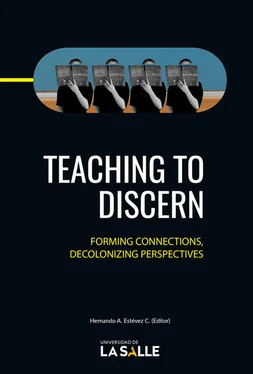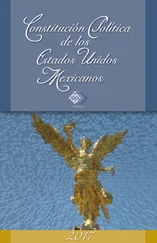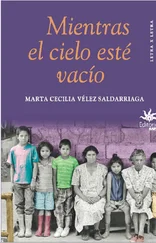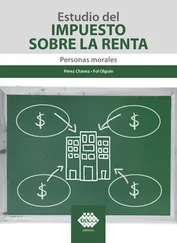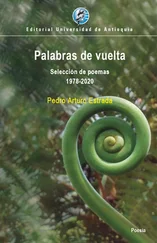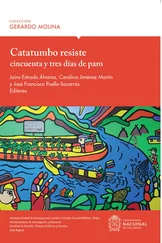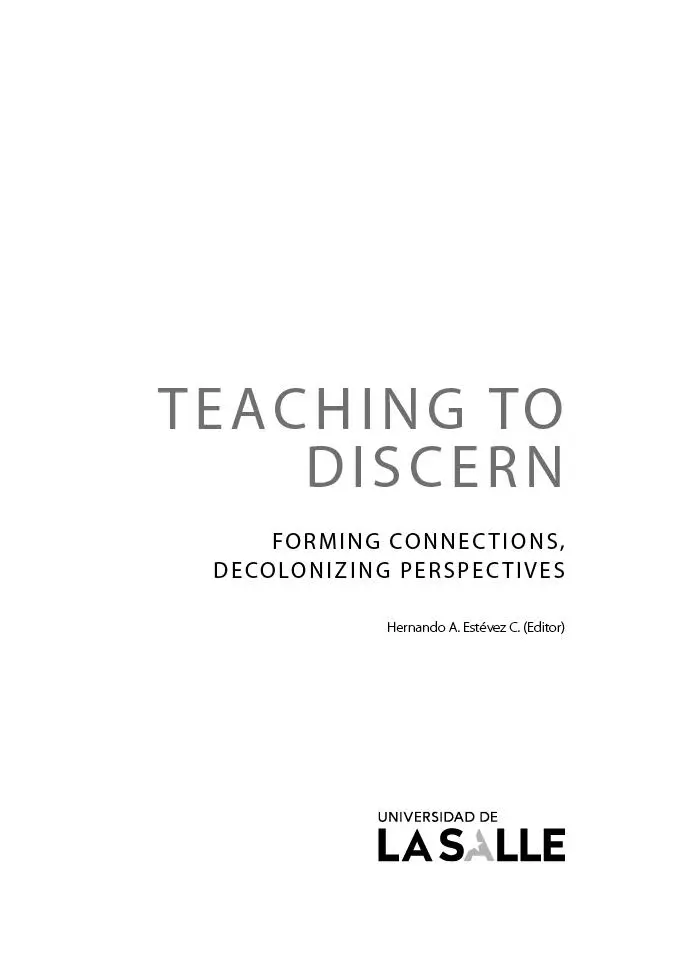
Teaching to discern : forming connections, decolonizing perspectives / Hernando A. Estévez C. (editor). – First edition. - Bogotá : Ediciones Unisalle, 2019.
174 páginas ; 24 cm.
Incluye referencias bibliográficas.
ISBN 978-958-5486-77-5 (impreso)
ISBN 978-958-5486-78-2 (digital)
1. Programas de intercambio de maestros 2. Intercambios educativos 3. Educación y globalización 4. Educación internacional 3. Prácticas de la enseñanza I. Estévez Cuervo, Hernando Arturo
CDD: 370.116 ed.22
CEP-Universidad de La Salle. Dirección de Bibliotecas
ISBN: 978-958-5486-77-5
e-ISBN: 978-958-5486-78-2
First Edition: Bogotá D. C., December 2019
© Universidad de La Salle
Published by
Ediciones Unisalle
Cra. 5 n.º 59A-44, Edificio Administrativo, piso 3
PBX: (571) 348 800, Ext.: 1224 and 1226
edicionesunisalle@lasalle.edu.co
Editorial Director
Alfredo Morales Roa
Editorial Coordinator
Andrea del Pilar Sierra Gómez
Proofreader
Melissa Agudelo Magalhães
Cover Designer
Milton Ruiz
Layout
Milton Ruiz
Photography
Andrés Valdés
Any reproduction of this book, in full or in part, by any means whatsoever, is strictly prohibited, as provided by law.
Table of Contents
1. Introduction INTRODUCTION Hernando A. Estévez1 1 Hernando A. Estévez is a philosopher from Purdue University, Magister in Liberal Studies at Indiana University and PhD in Philosophy from DePaul University. Currently, he is the Dean of the Faculty of Philosophy and Humanities at Universidad de La Salle.
Hernando A. Estévez C. INTRODUCTION Hernando A. Estévez1 1 Hernando A. Estévez is a philosopher from Purdue University, Magister in Liberal Studies at Indiana University and PhD in Philosophy from DePaul University. Currently, he is the Dean of the Faculty of Philosophy and Humanities at Universidad de La Salle.
Section I.Teaching to Discern: Experience of the Summer Academy from an Organizational Perspective SECTION I Teaching to Discern: Experience of the Summer Academy from an Organizational Perspective
1. Grappling with the Challenges of Social Development through In-House International Training 01 Grappling with the Challenges of Social Development through In-House International Training Giovanni Anzola1 Peter W. Cunningham2 1 Giovanni Anzola has a Bachelor Degree in Education from Universidad Pedagógica Nacional, Colombia. He also has studies in Project Management, Human and Financial Resources and Leadership from the Carl von Ossietzky University of Oldenburg, and is a PhD in Philosophy from Nelson Mandela University. 2 Peter W. Cunningham is a professor at Nelson Mandela University. Economic Sociology Department, Faculty Member.
Giovanni Anzola & Peter W. Cunningham 01 Grappling with the Challenges of Social Development through In-House International Training Giovanni Anzola1 Peter W. Cunningham2 1 Giovanni Anzola has a Bachelor Degree in Education from Universidad Pedagógica Nacional, Colombia. He also has studies in Project Management, Human and Financial Resources and Leadership from the Carl von Ossietzky University of Oldenburg, and is a PhD in Philosophy from Nelson Mandela University. 2 Peter W. Cunningham is a professor at Nelson Mandela University. Economic Sociology Department, Faculty Member.
2. Education, Pedagogy and the Content of Education 02 Education, Pedagogy and the Content of Education Hernando A. Estévez
Hernando A. Estévez 02 Education, Pedagogy and the Content of Education Hernando A. Estévez
Section II.Exploring Teaching Abroad SECTION II Exploring Teaching Abroad
1. Rewards and Challenges of Teaching Abroad 01 Rewards and Challenges of Teaching Abroad Elizaveta S. Golousova1 1 Elizaveta S. Golousova is a professor for the Department of Periodical Press and Online Media and International Economics and Management at the Ural Federal University (Yeltsin).
Elizaveta S. Golousova 01 Rewards and Challenges of Teaching Abroad Elizaveta S. Golousova1 1 Elizaveta S. Golousova is a professor for the Department of Periodical Press and Online Media and International Economics and Management at the Ural Federal University (Yeltsin).
2. Making Relations: A Decolonizing Perspective on Teaching Abroad
Janice Cindy Gaudet
3. Teaching Creativity and Innovation in an International Context
Jordi Mas-Castellà
Section III.Reflections on Social Practices and Globalized Pedagogies
1. Transposing Reflective Practices: Learning to Teach Abroad
Donna-Maria Maynard
2. Reflections on Teaching Science and Technology Studies through Problem-Based Learning in Bogotá, Colombia
Jacqueline Gaybor Tobar
3. Toulouse–Bogotá: More than a Round Trip
Nour Alrabie
4. Reflections on Teaching Social Justice and Rights in a Multicultural Environment
Keith William Diener
5. Reviving Social Imagination
Mae Urtal Caralde
INTRODUCTION
Hernando A. Estévez1
1 Hernando A. Estévez1 1 Hernando A. Estévez is a philosopher from Purdue University, Magister in Liberal Studies at Indiana University and PhD in Philosophy from DePaul University. Currently, he is the Dean of the Faculty of Philosophy and Humanities at Universidad de La Salle.
Hernando A. Estévez is a philosopher from Purdue University, Magister in Liberal Studies at Indiana University and PhD in Philosophy from DePaul University. Currently, he is the Dean of the Faculty of Philosophy and Humanities at Universidad de La Salle.
The issue of academic environments involves both research and practice. It gathers theoretical and practical pieces of knowledge for a permanent analysis and evaluation of pedagogy, content, and accomplishments in the educational field. Moreover, educational practices no longer occur within the boundaries of a specific field; in a globalized world, those practices must overcome their traditional boundaries in order to expand to different disciplines and to different ways of understanding pedagogy. In our time, knowledge travels; ideas and experiences are shared in educational platforms worldwide, while educators and students create novel ways to collectively participate in research projects that contribute to a greater understanding of the universe.
As a field, educational research faces growing challenges for dealing with the requirements of globalization; nowadays, education is not simply synonymous with pedagogical theories that provide frameworks for developing academic programs. The academic environment must be designed to introduce students to different social, political and economic phenomena and to connect them with knowledge of a broader reality. Researchers in the educational field must also examine historical and social dynamics that influence the development of education while considering their implications for different cultures.
On the other hand, one of the key issues researchers face is the extent to which a globalized education is possible; that means they need to be aware of current social, political ideologies and policies that are not necessarily in accordance with this educational project. Understanding education implies understanding the context in which pedagogical practices are taking place; at the same time, in this field, novel political paradigms and ideas of equality, equity and human rights should be confronted.
Читать дальше
